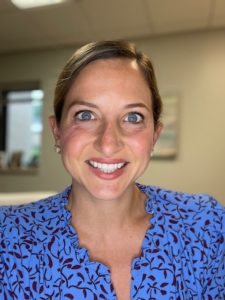 Like so many of the staff alumni, Mary-Kate Carey, PhD, BCBA-D, LBA, has used her experience at The New England Center for Children® (NECC®) to fuel her career. After spending time at NECC as a teacher in the residential program and program specialist in the Homebased program, Carey left NECC for her hometown, Birmingham, AL. Since then, she has played an influential role at both her new workplace and in the direction of research efforts in the state.
Like so many of the staff alumni, Mary-Kate Carey, PhD, BCBA-D, LBA, has used her experience at The New England Center for Children® (NECC®) to fuel her career. After spending time at NECC as a teacher in the residential program and program specialist in the Homebased program, Carey left NECC for her hometown, Birmingham, AL. Since then, she has played an influential role at both her new workplace and in the direction of research efforts in the state.
Since 2018, Carey has worked for Glenwood, Inc., a nonprofit headquartered in Birmingham, AL that provides services to individuals with autism and other developmental disabilities. Upon her arrival, Carey was tasked with leading the company’s early intensive behavioral intervention (EIBI) program. The program served 20 children, providing 37.5 hours of 1 on 1 applied behavior analysis therapy per week. In this role, Carey drew heavily on the experience she gained while a program specialist in the Homebased department at NECC.
“It shaped my understanding of how to structure EIBI services for children and how to direct my own program,” she said. “Another thing I learned at NECC, that I then brought to the EIBI program, was the idea of a consultative model where behavior analysts work alongside speech language pathologists and occupational therapists to better the services that the child is receiving. That model was an incredible takeaway from NECC and helped transform the services the EIBI program at Glenwood provides to their clients.”
After leading the EIBI program for nearly three years, Carey transitioned into a different role at the company. Today, her work focuses on further developing the scientist practitioner model and research at Glenwood. To do this, though, Carey first had to foster infrastructure in the state that would support these research efforts. Alabama has relatively few research programs, with a vast majority of those associated directly with universities. Because of this, Carey recognized that in order for independent programs to be able to conduct well-vetted research, there was a need for an overarching review committee that would allow independent practitioners to have their research protocols approved. In doing this, not only would there be more guidance for researchers, but the rights of the research clients would also be better protected. In early 2021, Carey began work on assembling and enacting this committee, and by the end of summer 2021, they will begin to approve protocols for upcoming research projects. Her passion for research, which has led to this monumental step for research efforts in Alabama, was shaped by her experience at NECC.
“NECC taught me how to be a ‘good scientist’, and how to be excited about questioning things in the world around me. I learned how to be excited about being wrong about what I once thought was right because it means that I can learn new things. More than anything, NECC inspired in me the desire to learn and to always grow and figure out how I can continue to impact the world around me in a positive way.”
Carey’s positive impact has been seen by so many at NECC, Glenwood, and the research community in Alabama. She has influenced and helped so many, and her current work in establishing better research infrastructure is another step in impacting the lives of individuals with autism.
